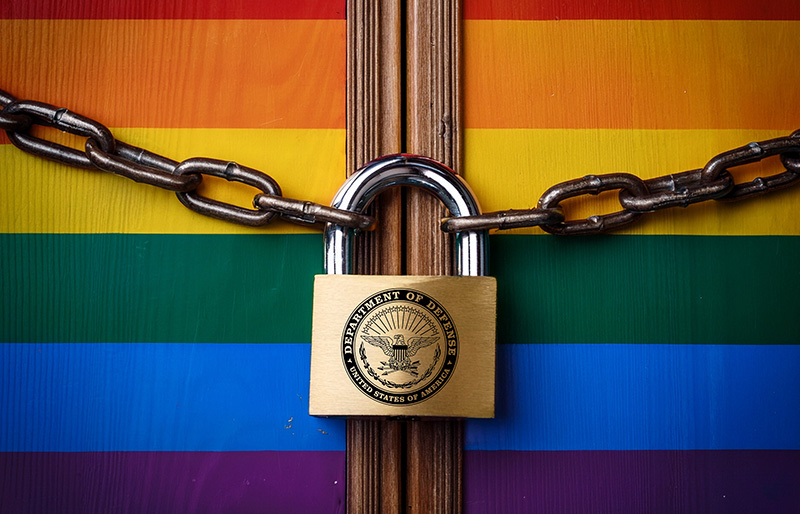Defense Funding Bill Stripped of Anti-LGBTQ Amendments
A "clean" version of the National Defense Authorization Act now heads to President Biden to sign into law.

Earlier this summer, the Republican-led House of Representatives, in a show of deference to the most extreme members of the GOP Caucus, attached several conservative amendments targeting access to abortion and LGBTQ rights to the National Defense Authorization Act.
Among those amendments were a measure to prohibit the health insurance program for active-duty service members and their dependents, and a program that covers military dependents who have special needs, from covering the cost of gender-affirming treatments, including hormones and surgical interventions.
Another anti-LGBTQ amendment, introduced by U.S. Rep. Lauren Boebert (R-Colo.), would have effectively banned any books featuring LGBTQ content from Department of Defense Education Activity schools, which are institutions located in various countries throughout the world that serve children and dependents of overseas military personnel.
Still other amendments attached to the House version of the NDAA were a ban on drag performances on military bases and other military-owned properties; a ban on flying Pride flags at military locations; and a restriction prohibiting service members from listing their pronouns or gender in official correspondence.
After the House passed its version of the bill, more than 150 House Democrats signed onto a letter asking the leadership of the House and Senate Armed Services committees to strip out the anti-LGBTQ provisions, arguing that keeping them in the final version of the NDAA would hamper the ability to recruit and retain service members who might happen to be LGBTQ.
“If service members are concerned for their health care, their right to exist, or the well-being of their children and loved ones, they cannot focus on their jobs, thereby weakening military readiness and retention rates,” the letter read. “Ensuring our ranks reflect the diversity of the American people is essential to the morale and cohesion of our Armed Forces and to our national security.”
The Democratic-led Senate subsequently passed its own version of the bill without the restrictions. Because the versions passed by each chamber were not identical, the defense funding bill had to go to a conference committee to iron out the differences. Soon, most of the anti-LGBTQ provisions disappeared.
The version of the bill approved by the conference committee does prohibit military personnel and DOD employees from displaying “a flag other than an approved flag” in workspaces, common areas, or public areas, according to The Hill.
While that provision could still be used to ban Pride flags, the fact that the bill doesn’t specifically single out the Pride flag for a ban is viewed by some as a victory of sorts. The restrictions on gender-affirming care, the book ban, and drag ban are no longer contained in the funding bill.
But removing those amendments left socially conservative warriors within the House Republican Caucus furious.
U.S. Rep. Marjorie Taylor Greene (R-Ga.) blasted the removal of the conservative social issues from the bill in a video on her social media accounts.
“The whole NDAA deal was made between Speaker [Mike] Johnson, [Senate Majority Leader] Chuck Schumer, and the [House Armed Services] Committee, and people like me, we didn’t get to participate,” she said. “We were appointed to participate to make sure: no money for abortion, no money for trans.
“The policy is in place that funding is there for abortion travel, the policy is still in place for trans in the military and everything that goes with it,” she continued. “Democrat trans policy, Democrat abortion policy, 300 million for Ukraine is back in the NDAA. Now, we’re supposed to just grin and take it with no say in the final bill.
“This was a total sell-out of conservative principles and a huge win for Democrats,” she said, concluding her rant. “Congratulations to my colleagues on the other side of the aisle, you should all be excited to vote for this! I’m a HELL NO!”
Similarly, members of the House Freedom Caucus attacked House Speaker Mike Johnson (R-La.) in an internal memo for failing to advocate fiercely and effectively enough to allow the anti-LGBTQ provisions to remain in place.
The memo called the NDAA “an utter disaster for House Republicans and a massive unforced error from leadership,” according to Axios, who obtained a copy.
“This is an obvious play to end-run conservative objections and pass liberal ‘woke’ military policy with the help of House Democrats,” the memo reads.
Some Freedom Caucus members took their objections to the House floor, denouncing the compromise version of the NDAA.
“A vote for this bill is a perpetuation of the woke policies undermining our military, bringing down the morale, driving down recruiting and now undermining the civil liberties of the American people,” Rep. Chip Roy (R-Texas) said.
“With this NDAA conference report you almost feel like a parent who’s sent a child off to summer camp, and they’ve come back a monster,” Rep. Matt Gaetz (R-Fla.) said. “That’s what we’ve done. This bill came back in far worse shape.”
Johnson — who is neither “woke,” nor an ally to the LGBTQ community — pushed back against the assertions made in the memo, arguing that there are plenty of conservative priorities contained within the NDAA.
“This year’s NDAA is over 2,000 pages shorter than last year’s, reins in taxpayer-funded censorship of conservative media, bans CRT in the military and its schools, hollows out Biden’s DEI bureaucracy at the Pentagon, and protects the rights of military parents in their children’s education,” a spokesperson for Johnson’s office said in a statement to Axios.
Ultimately, the final version of the NDAA passed the Senate by an 87-13 margin before passing the House of Representatives by a vote of 310-118. The bill authorizes $886 billion in national defense funding for fiscal year 2024, an increase of $28 billion over last year, reports CNN.
The measure now awaits President Biden’s signature before it can become law.
Support Metro Weekly’s Journalism
These are challenging times for news organizations. And yet it’s crucial we stay active and provide vital resources and information to both our local readers and the world. So won’t you please take a moment and consider supporting Metro Weekly with a membership? For as little as $5 a month, you can help ensure Metro Weekly magazine and MetroWeekly.com remain free, viable resources as we provide the best, most diverse, culturally-resonant LGBTQ coverage in both the D.C. region and around the world. Memberships come with exclusive perks and discounts, your own personal digital delivery of each week’s magazine (and an archive), access to our Member's Lounge when it launches this fall, and exclusive members-only items like Metro Weekly Membership Mugs and Tote Bags! Check out all our membership levels here and please join us today!
























You must be logged in to post a comment.